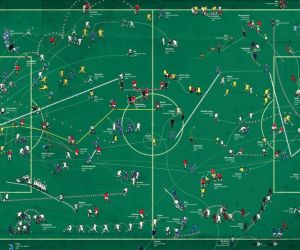The Beautiful Game

Negativity bias. Scientists say it’s a thing. Humans remember bad things longer and more vividly than good things, and with good reason. Putting your hand on a hot stove, your finger in an electric socket or your faith in a charlatan can hurt or kill you, so it's best to remember them well. Negativity bias has helped us survive through the eons. As pre-historic nomads watched a big fluffy cat eat their friend Bob, they filed that away in the not good section of their memories and henceforth steered clear of lions.
Today, "Breaking News!" is a favorite of the teleprompter jockeys to get our attention. Once, something that followed those words was actually impactful to our lives, and so we stop and listen. But it’s usually a funnel cloud a thousand miles away or a Kardashian in crisis. That some start every broadcast with the same alarming declaration must be hilarious to them. Or is it soothing? I don't know. It ain't my thing.
Soccer isn't quite my thing either, but as I climb up and down the stadium steps exercising this morning while the varsity plays, I learn two things. One is "The Beautiful Game" tagline starts to make more sense to me from above the playing field. I'm sure it means many things to folks more indoctrinated in the game, but this elevated vantage point at least has me better understanding the ebb and flow of soccer. On the playing field, it just looked like running around after a ball. Up here, there's strategy, tactics and plays evident, and the game rises several notches in my estimation.
The second thing I learn is The Beautiful Game is marred by the typical parental “advice”. “Throw strikes” is whitenoise to me around a ballfield, and I’ve heard enough “hit somebody” at hockey games to last a lifetime, so while the bellowed instructions are particular to soccer and new to me, I’ve seen this before. On the field (pitch?) the kids parry and thrust as a team, constantly in motion, creating small margins of opportunity, only to have it met and reversed by the opposing team, also constantly in motion. In the stands, old people who could not last thirty seconds at game speed without collapsing sit on supplemental cushions, as if their posteriors weren’t sufficiently padded. Play, they can’t. Shout, they can.
Teddy Roosevelt summed it up well with his “man in the arena” speech a hundred and five years ago. “It is not the critic who counts; not the man who points out how the strong man stumbles, or where the doer of deeds could have done them better. The credit belongs to the man who is actually in the arena …”. It goes on from there and closes strongly with a line about the cold, dead, timid heart of critics.
“Breaking News!” I added the words “dead” and “heart”. Because that’s what I think is at the choice between creating and critiquing. A cold, dead heart.
Oh, to have those hearts out there on the soccer pitch. Beating, pulsing and thumping through exhaustion. A soccer game? It’s more than that. From up here, you can see the beautiful act of creation. Creating tactical opportunity. Creating collective memory. Creating time itself as a shared experience. To be a creator – in any endeavor – is to live. To be a critic, is to die. That’s the essence of advice I’ve given my children as they chart their collegiate journeys to careers. Be a creator.
The iPhone buzzes with the e-mail of a somewhat ironic critique just in as I’m too dumb to stop working on Saturday. The follow up e-mails will buzz, buzz, buzz as more weekend whitenoise. The sun will rise and the breaking news and critique will continue because … well … they just can’t help themselves.
Neither can I. Through the lens of my camera taking pictures of Davenport’s future at Emeis ballfields, all I see are creators.
Life is a beautiful game.

